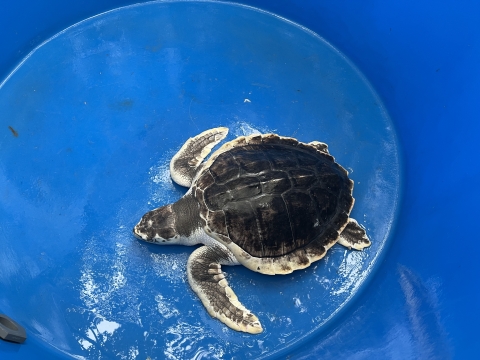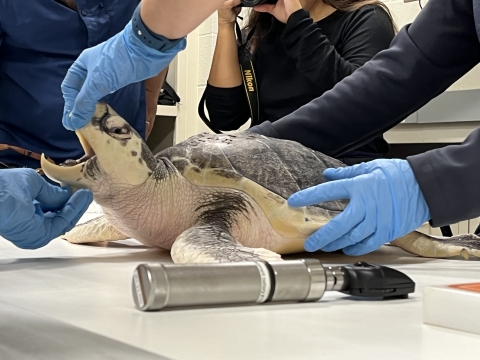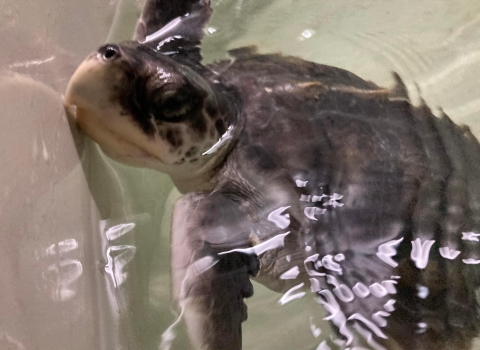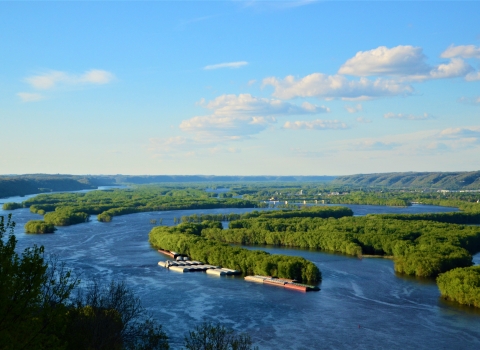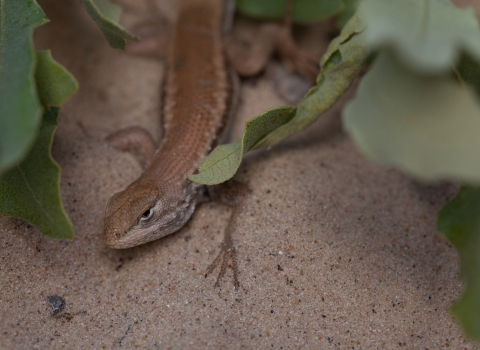A remarkable story of international collaboration and conservation is coming to a happy ending. With the help of a diverse group of partners and volunteers, a juvenile Kemp’s ridley sea turtle found stranded in the Netherlands is returning to her home waters in the Gulf of Mexico in early November.
The sea turtle was first found thousands of miles from home in October 2023, when a group of commercial fishermen discovered her entangled in their nets off the southwestern coast of the Netherlands. Upon her discovery, “Boeier” (pronounced boo-yare), named after the boat that found her, was transported to the Rotterdam Zoo for medical treatment for minor injuries.
Over the last year, the Zoo oversaw her rehabilitation while staff from the U.S. Fish and Wildlife Service coordinated the Convention on International Trade in Endangered Species of Wild Fauna and Flora (CITES) import permits that she needs to come home. After journeying across the Atlantic in late October, veterinary staff with the Houston Zoo will be evaluating and clearing her for release and the Texas A&M University at Galveston’s Gulf Center for Sea Turtle Research will be attaching a tracking device to monitor her future movements.
With the help of Rotterdam Zoo curator Mark de Boer, Boeier will be diving back into her native waters from a Galveston beach lined with supporters, including members of the public and the organizations that helped arrange her long journey home, on Nov. 4, 2024.
“We are so happy that Boeier was rescued, rehabilitated and deemed healthy enough to release so that she can rejoin the reproductive population and potentially contribute to the recovery of the species,” said Mary Kay Skoruppa, the Service’s Sea Turtle Coordinator for Texas. “An added benefit is the opportunity to increase the Service’s and NOAA Fisheries’ knowledge about survival and movements of juvenile Kemp’s ridley sea turtles that strand in areas far outside of their normal migration routes.”
Kemp’s ridley sea turtles are the smallest and one of the most endangered species of sea turtles in the world. Primarily found in the Gulf of Mexico and in coastal waters of the Atlantic along eastern North America, the juvenile turtles are occasionally carried across the Atlantic by the powerful Gulf Stream.
While Boeier’s journey is a little unusual, she isn’t the only sub-tropical sea turtle or even the only Kemp’s ridley to be found stranded in European waters last year.
Around the same time as Boeier, the Rotterdam Zoo took in seven cold-stunned loggerhead sea turtles and one other Kemp’s ridley named Blof who had been found on Dutch beaches. The Anglesey Sea Zoo in North Wales has also taken in two stranded Kemp’s ridleys, including one named “Tally” that was released by partners from Galveston into the Gulf of Mexico last year.
This increase in Kemp’s ridley sea turtle strandings isn’t just an issue across the pond. In recent years, researchers have found an increasing number of cold-stunned sea turtles in New England, where they are seasonal residents in summer and early fall. Due to the hook shape of Cape Cod, instead of migrating south for the winter the juveniles are becoming trapped within the bay in waters that are too cold for them.
According to Fish and Wildlife Biologist Cynthia Rubio with the Service’s Texas Coastal and Central Plains Ecological Services Field Office, Boeier may be an example of what can happen when the juveniles end up too far from home.
“We are starting to see more juvenile Kemp’s ridleys off the East Coast, and due to climate change climate change
Climate change includes both global warming driven by human-induced emissions of greenhouse gases and the resulting large-scale shifts in weather patterns. Though there have been previous periods of climatic change, since the mid-20th century humans have had an unprecedented impact on Earth's climate system and caused change on a global scale.
Learn more about climate change the warmer water is pulling them into the Atlantic,” Rubio said. “I would bet that Boeier is probably one of those juveniles that was trapped there and drifted across the Atlantic.”
According to NOAA Fisheries, the annual average of Massachusetts cold-stunned turtles in the last 5 years is 739, compared to 20 years ago when it was only 139. One reason for this increase is that the Gulf of Maine, including Cape Cod Bay, is warming faster than most other bodies of water in the world. These warm waters likely result in more sea turtles moving into the area, either following currents or prey.
As cold-stunning cases increase, more sea turtles need to be transported to rehabilitation facilities nationwide. These rescue efforts and eventual releases involve significant coordination and collaboration among hundreds of staff and volunteers from various organizations.
“When you have an endangered species, every individual counts,” Skoruppa said. “In addition to working with a great group of international partners dedicated to recovering sea turtles, turtles like Boeier help to educate and spread the word about what everyone in the public can do to help these imperiled species.”
Cold-stunning is just one threat sea turtles like Boeier face. Entanglement in fishing gear and marine debris also pose significant dangers. To safeguard these species, everyone can take simple actions like proper waste disposal, avoiding single-use plastics, and cleaning up beaches.
Anyone who encounters a sick, injured, stranded, or deceased sea turtle should report it immediately to a local stranding network. These organizations have trained professionals who can respond promptly and take appropriate action to help the animal.
Partners involved in the effort to rescue, rehabilitate and return Boeier to the U.S. include the U.S. Fish and Wildlife Service, Sea Animal Rescue Team Foundation (Netherlands), The Friends of Rotterdam Zoo (Vrienden van Blijdorp), Rotterdam Zoo, Houston Zoo, Texas A&M University at Galveston’s Gulf Center for Sea Turtle Research, U.S. Customs and Border Protection, Padre Island National Seashore, and the Texas Sea Turtle Stranding and Salvage Network.

